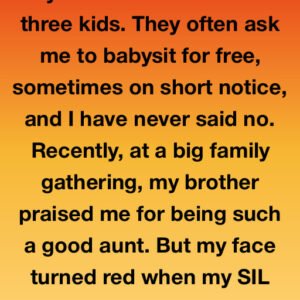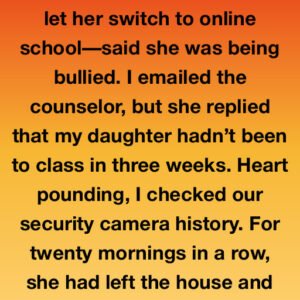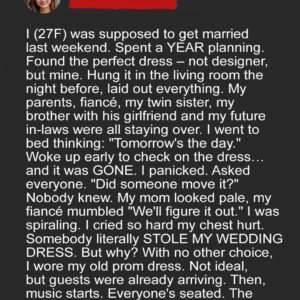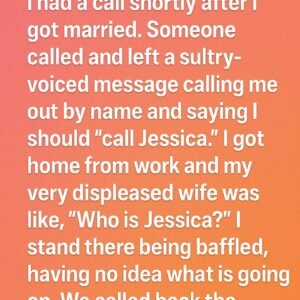My teenage daughter is glued to her phone 24/7. So I made a new rule: one hour of phone time a day. She didn’t take it well. “You’ll regret this!” she cried.
Last week, I got an urgent call from her school. Her teacher said, “Please come. Your daughter…” Her voice cracked. “We need to talk in person.”The first 10 minutes of that drive were just frustration. I kept thinking: She must’ve blown up at a teacher. Or got caught sneaking her phone in class. That wouldn’t be new—Mina had gotten a warning just last month for texting under the desk during a math test.
But something about her teacher’s voice stuck with me. The way she said “we need to talk” wasn’t angry. It sounded… shaken. That’s when my anxiety kicked in. My brain flipped through every scary possibility like a flipbook—accident, bullying, a health issue, or worse.
When I walked into the school office, Mina wasn’t there. Just her English teacher, Ms. Jafari, sitting in the counselor’s chair with red eyes. She stood up fast when she saw me, hands trembling a little.
“She did something remarkable,” she said. “But I don’t think she meant to.”
I was confused. “Wait, I thought she was in trouble?”
“No,” she said, pulling out a laptop. “I think you need to read this.”
She turned the screen toward me. There was a Google Doc open. The title: When You Make Me Look Up.
I scrolled. It was pages long. Raw paragraphs. Bits of poetry. Parts sounded like stories. But it was all written from the point of view of a teenage girl… describing what it feels like to be invisible in her own house.
Halfway through the first paragraph, I realized it was about me.
It wasn’t cruel. Just honest. She wrote how she felt ignored at dinner when I checked work emails. How I scrolled TikTok during our movie nights. How I answered my phone during her first choir solo.
One line hit me like a truck:
“So when Mom took away my phone, I thought she wanted to punish me. But now I wonder if she was asking me to see her too.”
I sat back, speechless.
“She submitted it to our class anonymously,” Ms. Jafari said. “But I recognized her voice. I had to check in with her. And she just… started crying.”
I wasn’t prepared for that.
We’d been at odds for months. Mina was 14 now, and everything I did seemed to irritate her. I chalked it up to normal teen stuff. I mean, I was the one who cooked, cleaned, and paid the bills. I’d earned the right to check my phone in peace, right?
But the piece she wrote didn’t read like a tantrum. It read like a white flag. Like she didn’t want to fight anymore, she just didn’t know how to start talking again.
I thanked the teacher and walked back to the car with a strange tightness in my chest.
When I got home, Mina was in her room, earbuds in, watching something. She didn’t look up when I walked in.
I sat on the edge of her bed.
“I read your piece,” I said.
She froze. Took one earbud out. “What piece?”
“You know which one.”
She went quiet. Cheeks flushed. “Ms. Jafari wasn’t supposed to tell anyone.”
“She didn’t. Not really. She just said it needed to be read.”
Mina stared at the floor, jaw tight. “It was dumb.”
“No,” I said. “It was brave.”
She didn’t cry. I think she was too surprised.
I reached over and took her hand. I hadn’t done that in months.
“I didn’t realize I was doing all that. But you were right.”
She looked up at me. I’ll never forget that look. Like she didn’t know if she could believe it.
So we made a new rule together that night. Not about phones. About presence.
One hour, every night. No screens. No distractions. Just us.
The first night, we ate noodles and played Uno. She kicked my butt.
The second night, she showed me some anime she liked. I didn’t understand much, but I listened.
By the end of the week, we were talking again—really talking. Not just school updates and grocery lists.
I found out she’d been feeling left out at school. That she didn’t want to do dance anymore. That she was scared of starting high school next year and didn’t know how to say it without sounding “babyish.”
One night, I asked, “What made you write that piece?”
She shrugged. “I don’t know. I was mad at first. But then… I just started typing. I didn’t think anyone would read it.”
“Well, I did,” I said. “And I think a lot of parents need to.”
So I asked her: “Would you be okay if I shared it? With my friends, online?”
Mina bit her lip. “Only if I can edit it first.”
A week later, we posted her revised version.
It blew up.
Hundreds of shares. Parents tagging each other. Teenagers saying “this is exactly how I feel.”
Some moms wrote, “I read this with my daughter, and we cried together.”
One dad messaged me: “Thank you. I took my son to dinner, just us two, for the first time in months.”
Mina couldn’t believe it.
She said, “I didn’t know adults felt the same way. Like… left out too.”
It sparked something in her. She joined the school newspaper. Started a “teen voices” column. She even got invited to speak at a local education panel.
She walked up to that mic in a too-big blazer and read her piece to a room full of teachers, parents, and students. And when she finished, they stood up.
I stood up too.
It took a phone ban to get us to look up.
But the truth is—this was never about the phone.
It was about me being present. Her being heard.
We still fight, of course. She’s a teenager. I’m a mom with a stubborn streak and a short fuse. But now, when things get tense, one of us will say, “Do we need a no-screen hour?”
And it always works.
The twist?
I thought I was teaching her discipline. Turns out, she was teaching me connection.
Phones aren’t the enemy. Distraction is.
And silence doesn’t mean nothing’s wrong—it means someone’s waiting to be seen.
If this touched you, send it to someone you love. Let them know you’re ready to look up.
Please like and share—this message might be the wake-up call someone else needs today.





